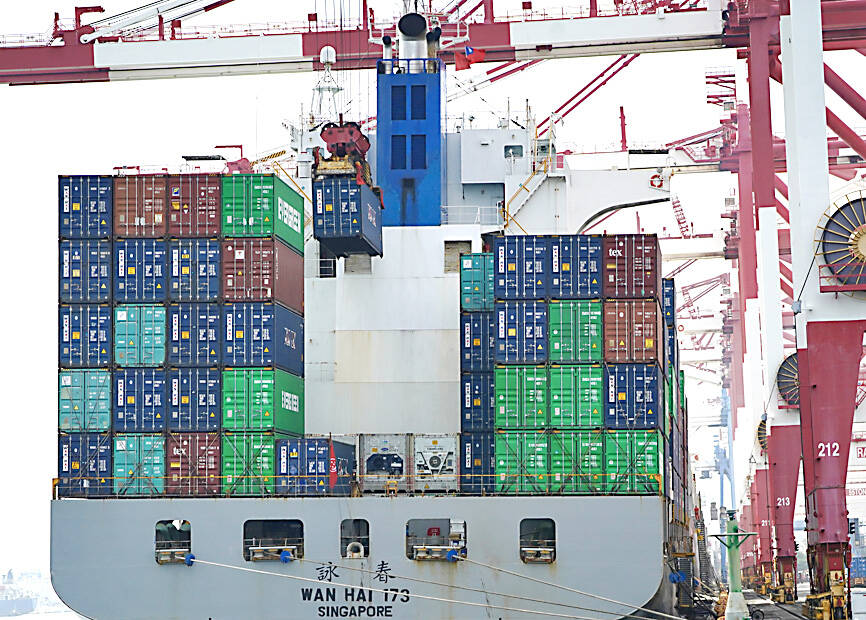Exports last month fell 10.4 percent from a year earlier to US$38.73 billion as demand for most products weakened, even though sales of products related to artificial intelligence (AI) gained traction, the Ministry of Finance said yesterday.
Outbound shipments have contracted for 11 consecutive months and would register negative growth of 5 to 10 percent this month as robust sales of AI-related products are not strong enough to reverse poor demand for other technology products, the ministry said.
“Demand for electronic components, mainly chips, failed to show noticeable improvement amid a global economic slowdown, explaining why major local technology firms have trimmed their revenue outlook for this year,” Department of Statistics Director-General Beatrice Tsai (蔡美娜) said, naming Taiwan Semiconductor Manufacturing Co (台積電) and United Microelectronics Corp (聯電) as examples.

Photo: CNA
Exports of electronics shrank 7.9 percent to US$15.61 billion, with semiconductor shipments softening 6.2 percent to US$14.55 billion, the ministry’s monthly report showed.
Taiwan is home to the world’s largest suppliers of electronics used in smartphones, PCs, big-data analysis equipment and AI applications.
Domestic and international customers largely adopted a cautious inventory strategy, placing rush or short orders to deal with economic uncertainty, Tsai said.
Information and communications technology (ICT) products were the only bright spot, with shipments soaring 54.1 percent to a record US$99.07 billion as global cloud service providers aggressively bought graphics processing units and servers to power AI applications, Tsai said.
Local suppliers are upbeat that the momentum would continue into the next quarter, she said.
Amid AI hype, ICT products have gained importance among exports, accounting for 23.4 percent of overall shipments last month and 16.2 percent in the first seven months of this year, Tsai said.
Sales of notebook computers also appeared to have come out of the woods after several quarters of inventory adjustments, she said.
Demand for ICT products was particularly strong in Europe, with outbound shipments to Europe rising 24 percent to a record US$4.65 billion last month, Tsai said.
The pace of decline in exports eased to single-digit percentages in ASEAN markets, Japan and the US, but remained in the double digits for shipments to China at 16.3 percent, she said.
The world’s second-largest economy has not reached a desirable level of recovery after ditching COVID-19 restrictions late last year, she added.
Exports of non-technology products fared worse, with slumps of between 22.1 percent and 57.3 percent from their year-earlier levels, Tsai said.
Imports fell 20.9 percent year-on-year to US$30.25 billion last month, giving Taiwan a big trade surplus of US$8.48 billion, suggesting a 70 percent increase year-on-year, the ministry said.
That is because local firms remained cautious in buying capital equipment as well as agricultural and industrial materials for export purposes, Tsai said.
In the first seven months, cumulative exports fell 16.9 percent year-on-year to US$240.81 billion, while imports dropped 20.2 percent to US$205.89 billion, the ministry said.

The US dollar was trading at NT$29.7 at 10am today on the Taipei Foreign Exchange, as the New Taiwan dollar gained NT$1.364 from the previous close last week. The NT dollar continued to rise today, after surging 3.07 percent on Friday. After opening at NT$30.91, the NT dollar gained more than NT$1 in just 15 minutes, briefly passing the NT$30 mark. Before the US Department of the Treasury's semi-annual currency report came out, expectations that the NT dollar would keep rising were already building. The NT dollar on Friday closed at NT$31.064, up by NT$0.953 — a 3.07 percent single-day gain. Today,

‘SHORT TERM’: The local currency would likely remain strong in the near term, driven by anticipated US trade pressure, capital inflows and expectations of a US Fed rate cut The US dollar is expected to fall below NT$30 in the near term, as traders anticipate increased pressure from Washington for Taiwan to allow the New Taiwan dollar to appreciate, Cathay United Bank (國泰世華銀行) chief economist Lin Chi-chao (林啟超) said. Following a sharp drop in the greenback against the NT dollar on Friday, Lin told the Central News Agency that the local currency is likely to remain strong in the short term, driven in part by market psychology surrounding anticipated US policy pressure. On Friday, the US dollar fell NT$0.953, or 3.07 percent, closing at NT$31.064 — its lowest level since Jan.

Hong Kong authorities ramped up sales of the local dollar as the greenback’s slide threatened the foreign-exchange peg. The Hong Kong Monetary Authority (HKMA) sold a record HK$60.5 billion (US$7.8 billion) of the city’s currency, according to an alert sent on its Bloomberg page yesterday in Asia, after it tested the upper end of its trading band. That added to the HK$56.1 billion of sales versus the greenback since Friday. The rapid intervention signals efforts from the city’s authorities to limit the local currency’s moves within its HK$7.75 to HK$7.85 per US dollar trading band. Heavy sales of the local dollar by

The Financial Supervisory Commission (FSC) yesterday met with some of the nation’s largest insurance companies as a skyrocketing New Taiwan dollar piles pressure on their hundreds of billions of dollars in US bond investments. The commission has asked some life insurance firms, among the biggest Asian holders of US debt, to discuss how the rapidly strengthening NT dollar has impacted their operations, people familiar with the matter said. The meeting took place as the NT dollar jumped as much as 5 percent yesterday, its biggest intraday gain in more than three decades. The local currency surged as exporters rushed to